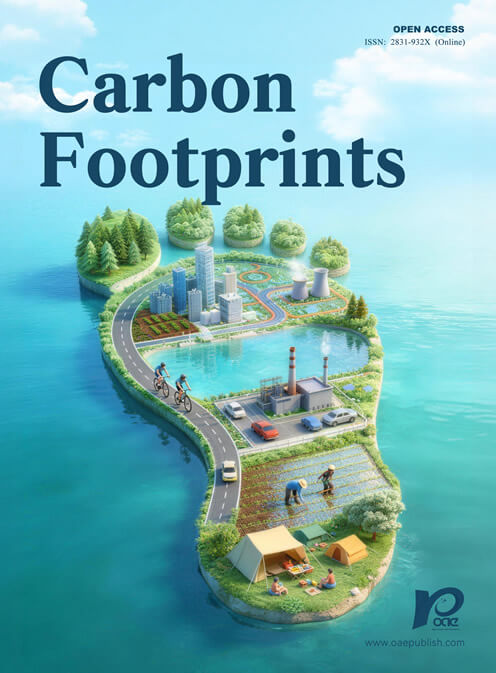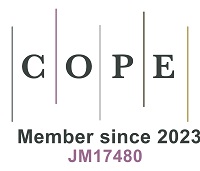REFERENCES
1. Dong, Q.; Zhong, C.; Geng, Y.; Dong, F.; Chen, W.; Zhang, Y. A bibliometric review of carbon footprint research. Carbon. Footprints. 2024, 3, 3.
2. Zhang, C.; Zhao, X.; Sacchi, R.; You, F. Trade-off between critical metal requirement and transportation decarbonization in automotive electrification. Nat. Commun. 2023, 14, 1616.
3. Dou, H.; Hao, H. The greenhouse gas emissions reduction co-benefit of end-of-life electric vehicle battery treatment strategies. Carbon. Footprints. 2024, 3, 2.
4. Istrate, R.; Mas-Fons, A.; Beylot, A.; et al. Decarbonizing lithium-ion battery primary raw materials supply chain. Joule 2024, 8, 2992-3016.
5. Chen, Q.; Lai, X.; Chen, J.; et al. A critical comparison of LCA calculation models for the power lithium-ion battery in electric vehicles during use-phase. Energy 2024, 296, 131175.
6. Liang, Y.; Su, J.; Xi, B.; et al. Life cycle assessment of lithium-ion batteries for greenhouse gas emissions. Resour. Conserv. Recy. 2017, 117, 285-93.
7. Peters, J. F.; Baumann, M.; Zimmermann, B.; Braun, J.; Weil, M. The environmental impact of Li-ion batteries and the role of key parameters - A review. Renew. Sustain. Energy. Rev. 2017, 67, 491-506.
8. Yu, W.; Zhou, J.; Hu, J.; Shang, Z.; Zhou, X.; Xu, S. Exploring the energy and environmental sustainability of advanced lithium-ion battery technologies. Resour. Conserv. Recy. 2025, 212, 107963.
9. Stavropoulos, P.; Giannoulis, C.; Papacharalampopoulos, A.; Foteinopoulos, P.; Chryssolouris, G. Life cycle analysis: comparison between different methods and optimization challenges. Procedia. CIRP. 2016, 41, 626-31.
10. Xu, Y.; Wang, F.; Zhang, T. Artificial intelligence is restructuring a new world. Innovation 2024, 5, 100725.
11. Buster, G.; Benton, B. N.; Glaws, A.; King, R. N. High-resolution meteorology with climate change impacts from global climate model data using generative machine learning. Nat. Energy. 2024, 9, 894-906.
12. Wu, Y.; Xu, M.; Liu, S. Generative artificial intelligence: a new engine for advancing environmental science and engineering. Environ. Sci. Technol. 2024, 58, 17524-8.
13. Wang, P.; Zhang, L. Y.; Tzachor, A.; Chen, W. Q. E-waste challenges of generative artificial intelligence. Nat. Comput. Sci. 2024, 4, 818-23.
14. Li, S.; Gao, H. O.; You, F. AI for science in electrochemical energy storage: A multiscale systems perspective on transportation electrification. Nexus 2024, 1, 100026.
15. Meng, K.; Xu, G.; Peng, X.; Youcef-toumi, K.; Li, J. Intelligent disassembly of electric-vehicle batteries: a forward-looking overview. Resour. Conserv. Recy. 2022, 182, 106207.
16. Pregowska, A.; Osial, M.; Urbańska, W. The application of artificial intelligence in the effective battery life cycle in the closed circular economy model - a perspective. Recycling 2022, 7, 81.
17. Ren, T.; Wu, X.; Wang, D.; et al. Sustainable recovery progress of ternary cathodes in lithium-ion batteries in the artificial intelligence era. Mater. Today. Energy. 2025, 49, 101844.
18. Dhumal, P.; Chakraborty, S.; Ibrahim, B.; Kaur, M.; Valsami-jones, E. Green-synthesised carbon nanodots: A SWOT analysis for their safe and sustainable innovation. J. Clean. Prod. 2024, 480, 144115.
19. Olabi, A.; Wilberforce, T.; Sayed, E. T.; et al. Battery energy storage systems and SWOT (strengths, weakness, opportunities, and threats) analysis of batteries in power transmission. Energy 2022, 254, 123987.
20. Romeiko, X. X.; Zhang, X.; Pang, Y.; et al. A review of machine learning applications in life cycle assessment studies. Sci. Total. Environ. 2024, 912, 168969.
21. Che, Y.; Stroe, D.; Hu, X.; Teodorescu, R. Semi-supervised self-learning-based lifetime prediction for batteries. IEEE. Trans. Ind. Inf. 2023, 19, 6471-81.
22. Jondhle, H.; Nandgaonkar, A. B.; Nalbalwar, S.; Jondhle, S. An artificial intelligence and improved optimization-based energy management system of battery-fuel cell-ultracapacitor in hybrid electric vehicles. J. Energy. Storage. 2023, 74, 109079.
23. Tu, Q.; Guo, J.; Li, N.; Qi, J.; Xu, M. Mitigating grand challenges in life cycle inventory modeling through the applications of large language models. Environ. Sci. Technol. 2024, 58, 19595-603.
24. Xu, Y.; Lin, T.; Du, P.; Wang, J. The research on a novel multivariate grey model and its application in carbon dioxide emissions prediction. Environ. Sci. Pollut. Res. Int. 2024, 31, 21986-2011.
25. Zhang, Y.; Teoh, B. K.; Wu, M.; Chen, J.; Zhang, L. Data-driven estimation of building energy consumption and GHG emissions using explainable artificial intelligence. Energy 2023, 262, 125468.









